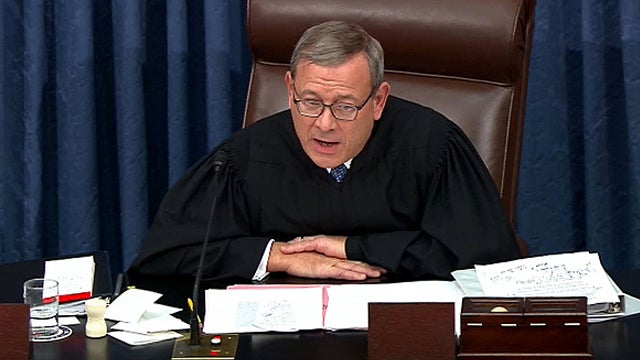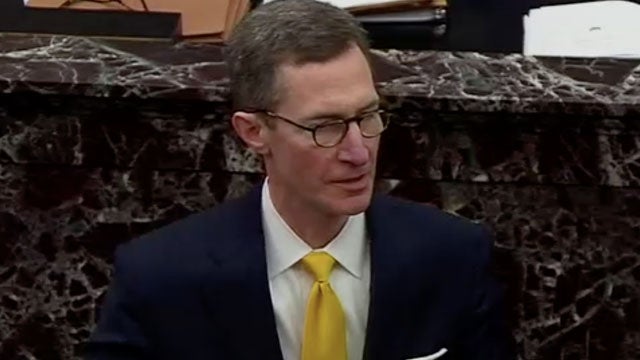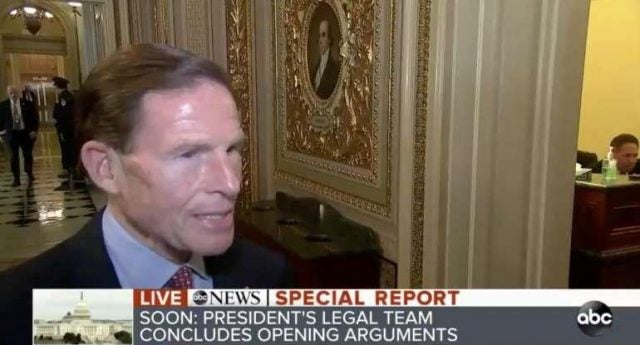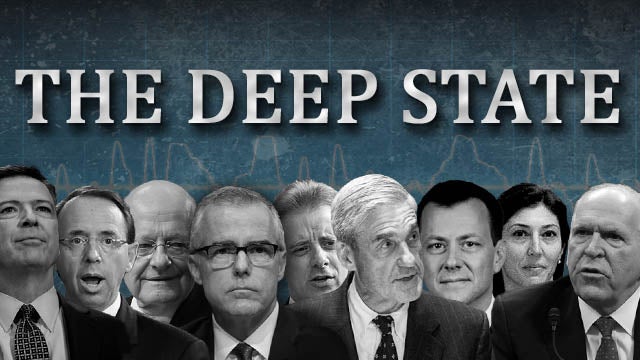RUSH: Somebody asked the House managers, “Well, why didn’t you…? Why didn’t you call witnesses? Why didn’t you…? Why didn’t you fight the president on executive privilege when you wanted witnesses in the House, in the hearings? Why didn’t you fight it?” Hakeem Jeffries stood up there and said, “The president didn’t assert executive privilege.
“He simply said he can do whatever he wants. He’s the president and he issued a blanket denial of everything.” I just want to make sure I heard what I heard, and I’m gonna need Philbin’s answer to this to make sure that I heard what I heard. … Okay. We have some of the Q&A. I had only a chance to watch this, you know, in three-minute spurts when we are here in the EIB obscene profit breaks. Hang on just a second. (interruption) Oh, okay. New beta update, I’m just informed, is ready to install. I’ll get to that in a minute.
Anyway, I’m kind of surprised, I guess — and maybe it’s ’cause I’m older. I’ve been to the U.S. Senate. My parents took me to the U.S. Senate with my brother when we were 15. I’ll never forget. Barry Goldwater was on the floor. They were debating the farm bill, ad this was during the days of Everett Dirksen and Barry Goldwater. I remembered there was somebody sitting in the same row we were chewing gum, and one of the pages came down and made the person stop and spit it out. Another person was reading a book and turning the pages.

The page came and took the book away. You can’t make any noise, can’t provide any kind of distraction whatsoever. I just remember… Now, granted, I’m 15. But, even after that, even as I grew older and the Senate began to be televised and I would watch it, I just had the impression that it was serious and formal, that it wasn’t sophomoric. I’m watching this, and the way this question-and-answer thing is formatted, the senators write their questions on a card, and then senators submit the cards to the chief justice, and the chief justice then reads the question.
I feel like I’m watching something happening here in the seventh grade. So the chief justice reads the question, puts his glasses down and says, “We will hear first from the House managers.” Then the House managers decide who among them’s gonna answer it, and they stumble around. They assign whoever to go up there and start answering the question and so forth. The chief justice seems to be treating these people like they’re morons, like they can’t follow basic instructions.
“We will hear first from the House managers.” I don’t know. Again, it’s a quick observation made over not very much time. I haven’t had a chance to really listen to this in context. But here is… We’ll start with sound bite 21, 22, 23. This is Susan Collins. You know, senators don’t read the questions. They send the questions to the chief justice, and this is it sounds…
COLLINS: I send a question to the desk on behalf of myself, Senator Murkowski, and Senator Romney.
ROBERTS: This is a question for the council for the president: “If President Trump had more than one motive for his alleged conduct — such as the pursuit of personal political advantage, rooting out corruption, and the promotion of national interests — how should the Senate consider more than one motive in its assessment of Article 1?”

RUSH: Okay. So I guess that sounds okay. It just sounds… It sounds like everybody thinks that they’re not too bright in there and they’ve gotta go very slow, make sure they don’t confuse anybody. But here’s the question Susan Collins asked (impression): “I send a question to the desk on behalf of myself — and I am myself — and Senator Murkowski and Senator Romney.” Okay, and so the chief reads the question:” This is a question for the council for the president,” meaning: You guys, you lawyers over there for the president, this is for you.
“If President Trump had more than one motive for his alleged conduct,” like suggesting that Burisma, the Bidens will be investigated. If the “alleged conduct [was] the pursuit of personal political advantage,” like trying to get dirt on Plugs, “rooting out corruption” in Ukraine “and the promotion of national interests,” if there’s three motives here, how should we senators “consider more than one motive in its assessment of Article 1?” So here is Patrick Philbin, and the answer… Well, you tell me. Here’s the answer…
PHILBIN: If there were a motive there was a public interest but also some personal interest, we think it follows even more clearly that that cannot possibly be the basis for an impeachable offense. And they’ve even said. They came up and they talked a lot about the Bidens. They talked a lot about these issues in 2016 election interference because they were saying there’s not even a scintilla — a scintilla — of any evidence of anything worth looking into there. And that’s the standard that they would have to meet, showing that there’s no possible public interest, and the president couldn’t have had any smidgen, even, of a public interest motive. It would be absurd to have the Senate trying to consider, “Well, was it 48% legitimate interests and 52% personal interest, or was it the other way? Was it 53% and 40?” You can’t divide it that way.

RUSH: He goes on to explain how you can’t impeach presidents for considering politics…
PHILBIN: Once you’re into mixed-motive land, it’s clear that their case fails. There can’t possibly be an impeachable offense at all. You think about it. All elected officials, to some extent, have in mind how their conduct, how their decisions, their policy decisions, will affect the next election. There’s always some personal interest in the electoral outcome of policy decisions — and there’s nothing wrong with that. That’s part of representative democracy. Once it is established that there is a legitimate public interest that could justify looking into something — just asking a question about something — the manager’s case fails, and it fails under their own terms.
RUSH: Now, that is perfectly clear to me, that you can’t take politics out of this, and that everybody in politics calculates how whatever their political actions are, how that’s gonna impact their reelection or their campaign or their polling data or their fundraising or whatever else. Their job approval numbers. You can’t separate the two. The House managers would like you to believe that (impression) “there is some unique area where everything is perfect, and nobody does anything for any personal gain whatsoever — and Trump violated it.
“Everything Trump does is for personal gain, and that’s putting himself ahead of the office,” and so forth. These guys have nuked that. I mean, after I hear this answer, I said, “That’s the case.” I mean, it should end the case. Shut it down. Go back and grab sound bite number 5 again.
I think… You know, this is one of these things… I led the program off with this today. Here is Da Nang Dick, Senator Richard Blumenthal of Connecticut, yesterday on Capitol Hill after the president’s lawyers had presented their case, after the House managers had presented theirs. So, both cases are in. That phase of this trial is over.
Here’s how Da Nang Dick characterized it…
 BLUMENTHAL: What you just saw was a fact-free summation of a case bereft of evidence. We need the evidence. We need the witnesses and documents.
BLUMENTHAL: What you just saw was a fact-free summation of a case bereft of evidence. We need the evidence. We need the witnesses and documents.
RUSH: How stupid…? I tell you, how ignorant, how unaware is this guy? He just admits that what everybody just saw was “a fact-free summation of the case bereft of evidence.” For those of you in Rio Linda, it means they didn’t have any: “a fact-free summation of a case bereft of evidence.” He is admitting that the House managers have no case, they have no evidence, and they didn’t present any — and he’s so cockeyed that he thinks that is a legitimate reason to call witnesses, that that’s a legitimate reason for the Senate to start doing its own investigation, because the House didn’t have a case.
This is like you being on trial for murder. The prosecution doesn’t have any evidence. They can’t convict you. So they ask one of the jurors, “Hey, would you mind doing further investigation for us? We don’t have any evidence! My closing argument is not gonna be able to convict the guy. You gotta go out and find more evidence for me!” It wouldn’t happen. But Da Nang Dick, he thinks he’s being brilliant here. He thinks he’s making the case for witnesses. He thinks he’s making the case for documents. Yeah, because the House didn’t have any witnesses, didn’t have any facts, didn’t have any case!
Well, as far as I’m concerned, that means shut it down. Shut it down. It means it is over. Professor Dershowitz is now suggesting that some of what the House managers have been doing is psychoanalyzing the president — and it’s true. They’ve been trying to get at his motives, what he wanted to do, not what he did, ’cause what he did is not impeachable. Again, all of this is the Democrats attempting to keep you from meddling in the 2020 election. They’re trying to prevent you from voting in the 2020 election.
Let me grab a quick call. Blaine, Washington. Edward, great to have you, sir, on the EIB Network. Hello.
CALLER: Yes. Good afternoon, Rush. I’m kind of beating a dead horse here, but if there is no criminal evidence, is there an option of a dismissal? That’s it.
RUSH: Well, here again, let me be very… This has been stated, again. There doesn’t need to be any criminal evidence. Impeachment can be whatever the House says it is, and that pretty much is true. “High crimes and misdemeanors” is a pretty broad thing. Impeachment is a political act, and the House can impeach the president any time they want, for any reason they want. They have to get the votes to do it, but they can impeach him for anything. There does not need to be a statutory crime committed.
There hasn’t been a statutory crime committed here. There hasn’t been an impeachable offense found — and yet, where are we? They can call it whatever they want; they can claim anything they want is impeachment. That’s what’s wrong with this, among many things wrong with it. They have watered down this entire constitutional procedure to now be meaningless. They have converted impeachment into simply another weapon in a partisan arsenal designed to get rid of a political opponent you don’t like. That’s what they’ve turned impeachment into.
That’s what this has become — and once the bar has been lowered as they have lowered it, it makes it easier to do it again and again. The idea of payback being a central part of politics, this will happen again. I’m not gonna predict when party will do it or when on over what, but it will happen again. The Democrats said they were gonna impeach Trump two weeks before he was inaugurated. They said they were gonna impeach him two weeks after he was inaugurated. The Mueller report, the Mueller investigation, Trump-Russia collusion — all of this is part of this culmination here.
If they could have gotten rid of Trump with the Mueller report, they would have. If they coulda gotten rid of Trump at the Kavanaugh hearings, they would have. If they could have gotten rid of Trump at any time prior to this, they would have. But since every effort has failed, here we are at impeachment — and this is a total setup. Can you believe that a phone call that 20 people were on — that 20 people heard, for which a transcript has been released — is why we’re here? Let that sink in for a moment. Just stop and think.

A phone call 20 people heard! The whistleblower who reported it did not hear it, in fact. The whistleblower got a secondhand version of it from Lieutenant Colonel Vindman. The whistleblower is a CIA operative from the John Brennan camp. He’s from the Obama administration, ae’s a holdover, and it has been uncovered that he and others in the National Security Council have been plotting to get rid of Trump beginning two weeks after Trump was inaugurated. The whistleblower’s first characterizations of the phone call:
“Shocking! Terrifying! Frightening! So bad, I couldn’t wait! I had to report it.” Then the transcript is released and there’s nothing shocking. There’s certainly nothing terrifying. There’s nothing earth-shattering. The whistleblower, the guy that got all this started, is the only person that hasn’t been heard from, because to hear from the whistleblower would expose Adam Schiff’s role in this entire fiasco. But a phone call that 20 people heard, 20 people on the call… By the way, that’s standard operating procedure.
Presidents don’t make phone calls with no witnesses. Official United States policy phone calls, one leader to another, there’s always a bunch of people on the phone call. Trump is being impeached in part here because Lieutenant Colonel Vindman prepared talking points, and Trump didn’t use any of them, and Schiff is saying, “See? This means he’s out for his own personal gain. He didn’t use the talking points that his professional, uh, ambassadorial staff and national security staff prepared, which means he’s in it for himself!
“It’s impeachable that Trump did not use the talking points.” What else did Schiff say? There’s some other crazy… Chris Coons. This is the Democrat senator from Delaware that corrupted Jeff Flake during the Kavanaugh hearings. Chris Coons said (summarized), “Hypothetically, Trump could be impeached for his tweets, his hateful tweets, his racist tweets. We could impeach Trump for that! Hypothetically.” He said this to Chuck Todd at NBC, who was salivating at the very idea.




